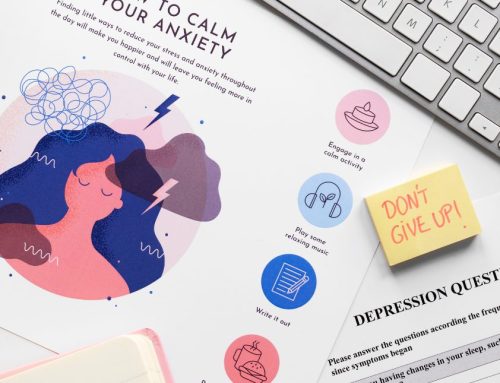
Living with bipolar disorder is a constant journey that demands incredible strength and resilience. It’s like riding a roller coaster through the twists and turns of your own mind – sometimes exhilarating, sometimes terrifying. Each day brings its own set of highs and lows, with emotions running wild in unpredictable waves. But amidst the chaos, there are moments of triumph and courage as we navigate through the turbulence within ourselves.
Bipolar disorder, formerly known as manic-depressive illness, is a mental health condition that affects millions of people worldwide. It is characterized by extreme mood swings that include emotional highs (mania or hypomania) and lows (depression). These mood episodes can range from euphoric energy and heightened creativity to profound despair and hopelessness. The unpredictability of mood episodes is one of the most daunting aspects of living with bipolar disorder. During manic episodes, individuals may experience a surge of energy, racing thoughts, increased productivity, and a diminished need for sleep. While these symptoms may initially feel invigorating, they can quickly spiral out of control, leading to impulsive behaviors, reckless decision-making, and strained relationships.
Managing bipolar disorder requires a multifaceted approach that combines medication, therapy, lifestyle modifications, and a strong support network. Medication is often prescribed to help stabilize mood swings and prevent manic or depressive episodes. Therapy can be beneficial in helping individuals learn coping strategies and develop skills to manage their symptoms. Lifestyle modifications such as regular exercise, a healthy diet, and adequate sleep are also important in managing bipolar disorder. A strong support network of family, friends, and mental health professionals can provide the necessary emotional support and encouragement needed to manage the disorder.
Despite the challenges of living with bipolar disorder, there is hope for those struggling with the condition. With the right treatment and support, individuals can lead fulfilling and productive lives. It is important to seek help if you or a loved one is experiencing symptoms of bipolar disorder. With early intervention and proper treatment, the roller coaster ride of bipolar disorder can be managed, and stability can be achieved.
Living with bipolar disorder can be a challenging experience that can take a toll on an individual’s motivation, pleasure, and hope for the future. The highs and lows of the disorder can be overwhelming, which is why it is important to develop resilience, self-awareness, and a willingness to seek help when needed.
Pharmacological interventions are often used to manage bipolar disorder symptoms and stabilize mood fluctuations. Mood stabilizers, antipsychotics, and antidepressants are commonly prescribed, but finding the right combination of medications can be a trial-and-error process, which can be accompanied by frustrating side effects and adjustments. Despite this, medication is a crucial component of managing bipolar disorder and should be taken as prescribed by a healthcare professional.
In addition to medication, therapy plays a crucial role in managing bipolar disorder. Cognitive-behavioral therapy (CBT), dialectical behavior therapy (DBT), and psychoeducation are all effective treatments that can help individuals develop coping strategies, identify triggers, and challenge distorted thought patterns. By learning to recognize early warning signs of mood shifts, individuals can implement proactive measures to prevent full-blown episodes and maintain stability.
Lifestyle modifications can also have a significant impact on the course of bipolar disorder. Prioritizing sleep hygiene, maintaining a balanced diet, engaging in regular exercise, and avoiding drugs and alcohol can all help regulate mood and improve overall well-being. Establishing a consistent daily routine and practicing stress-management techniques such as mindfulness meditation and deep breathing exercises can also contribute to symptom management.
However, perhaps the most vital component of living with bipolar disorder is cultivating a strong support network. It is important to have friends and family who understand the disorder and can offer support and encouragement during difficult times. Joining a support group can also be beneficial as it provides an opportunity to connect with others who are going through similar experiences.
In conclusion, managing bipolar disorder requires a multifaceted approach that includes medication, therapy, lifestyle modifications, and a strong support network. It is essential to work closely with a healthcare professional to develop an individualized treatment plan that addresses your unique needs and goals. With the right tools and support, it is possible to live a fulfilling life with bipolar disorder.
Support groups can be incredibly valuable for individuals who are experiencing difficult times. Whether it be coping with a chronic illness, navigating a life transition, or dealing with the loss of a loved one, having a reliable system of support can provide comfort, encouragement, and perspective during the darkest moments. There is something incredibly empowering about having a group of people who truly understand what you are going through and can offer practical advice, emotional support, and a listening ear.
One of the key components of successful support groups is open communication. Participants need to feel comfortable sharing their thoughts and feelings without fear of judgment or criticism. This requires a safe, non-threatening environment where everyone is free to express themselves honestly. When people feel heard and validated, they are more likely to open up and share their experiences, which can be incredibly healing.
Another important quality in support groups is empathy. Participants need to feel that their experiences are understood and valued by others in the group. This requires a willingness to put oneself in another person’s shoes and really listen to their perspective. When people feel that they are heard and understood, they are more likely to feel a sense of connection and belonging.
Nonjudgmental listening is also essential in support groups. Participants need to feel that they can express themselves without fear of being criticized or judged. This requires active listening skills, such as reflecting back what the person has said and asking clarifying questions. When people feel that they are truly being heard and understood, they are more likely to feel a sense of relief and validation.
In summary, support groups can be incredibly beneficial for individuals who are experiencing difficult times. Open communication, empathy, and nonjudgmental listening are essential qualities that foster trust and connection within these relationships. When people feel heard and validated, they are more likely to feel a sense of empowerment and resilience in the face of adversity. Support groups offer a safe, non-threatening environment where people can share their experiences, gain practical advice, and find emotional support during the darkest moments.
Despite the challenges inherent in living with bipolar disorder, many individuals find meaning, purpose, and even strength in their journey. Creativity often flourishes amidst the tumultuous landscape of the bipolar mind, with artists, writers, and musicians channeling their emotional intensity into works of art that resonate with others. Moreover, the resilience forged through adversity can instill a deep sense of self-awareness, compassion, and empathy for others facing similar struggles.
Ultimately, living with bipolar disorder is a testament to the complexity of the human experience. It’s a reminder that mental health exists on a spectrum, and each individual’s journey is unique and valid. By embracing the highs and lows, seeking treatment and support, and cultivating self-awareness and resilience, those living with bipolar disorder can navigate the peaks and valleys of their inner world with courage and grace. Through understanding, acceptance, and compassion, we can create a world where individuals with bipolar disorder are valued, supported, and empowered to live fulfilling lives.
Share This Story, Choose Your Platform!
The Best Address for EMDR Equipments: emdrtech
emdrtech stands at the forefront of the industry, offering cutting-edge solutions and equipment for EMDR therapy. Our aim is to empower therapists with the tools they need to administer highly efficient and readily available treatments to their clients.
For those practicing EMDR therapy, we urge you to explore the ways in which emdrtech can enhance your profession. Take a moment to visit our website, where you can peruse our extensive range of products and services, and delve into our unwavering dedication to pushing the boundaries of innovation!
While MAT and DAT models provide auditory-vibration bilateral stimulation, the upper-segment model ATV comes with a multicolor LED bar and provides triple stimulation functions including visual, auditory, and vibration.
You can find all kinds of information about emdrtech devices, which are developed with the joint initiative of expert engineers and EMDR therapists, on our product introduction pages.
For information EMDR equipments, you can contact us at info@emdrtech.com or through our WhatsApp contact line at +90 (507) 107 31 11.






